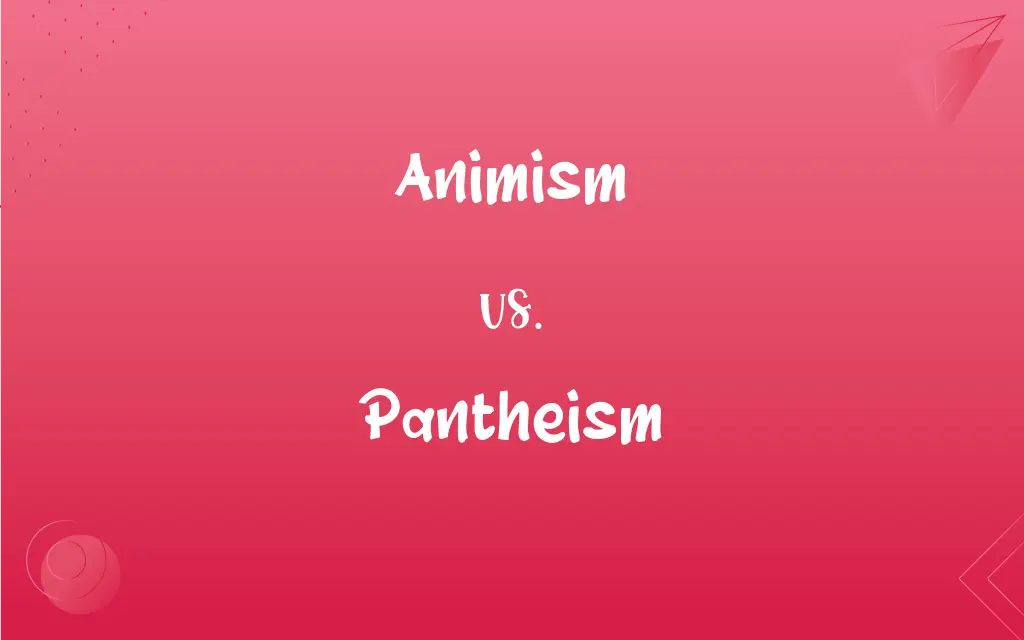Animism vs. Pantheism: What's the Difference?
By Harlon Moss & Aimie Carlson || Updated on May 23, 2024
Animism is the belief that objects, places, and creatures possess a spiritual essence, while pantheism is the belief that the universe and God are identical, seeing everything collectively as divine.

Key Differences
Animism is a worldview where non-human entities like animals, plants, and inanimate objects are considered to have a spiritual essence. It is often found in indigenous and tribal religions where nature and its elements are revered. Pantheism, on the other hand, posits that everything in the universe is part of an all-encompassing God, with no distinction between the creator and the creation.
Animism emphasizes individual spirits in natural objects, attributing a unique spirit to each entity. This belief fosters a deep connection with nature and respect for all living and non-living things. Pantheism, however, views the universe itself as divine, merging all existence into a single, unified spiritual reality.
In animism, rituals and practices are often focused on communicating with or appeasing the spirits residing in various natural elements. These rituals vary greatly depending on the specific culture and its natural surroundings. Pantheism typically does not involve individual spirits but instead may include meditative practices that emphasize the unity of all existence.
Animism is deeply embedded in the cultural practices and daily lives of its adherents, influencing how they interact with the environment and each other. This can lead to a strong sense of community and environmental stewardship. Pantheism, on the other hand, often appeals to those seeking a more philosophical or abstract understanding of spirituality, finding divinity in the entirety of the cosmos rather than in discrete entities.
Comparison Chart
Core Belief
Spirits in objects and creatures
Universe and God are identical
ADVERTISEMENT
Spiritual Focus
Individual spirits
Unified divine reality
Practices
Rituals to communicate with spirits
Meditative practices on unity
Cultural Influence
Deeply embedded in daily life and environment
Philosophical and abstract appeal
Nature of Divinity
Separate spirits in nature
All-encompassing divine presence
Animism and Pantheism Definitions
Animism
Belief that all objects have spirits.
The tribe practices animism, believing the forest is alive with spirits.
ADVERTISEMENT
Pantheism
Belief that the universe is divine.
Pantheism sees the cosmos itself as a manifestation of God.
Animism
Attributing souls to plants and inanimate objects.
Animism teaches that rocks and rivers have their own consciousness.
Pantheism
Unified spiritual reality.
Pantheism encourages seeing the oneness of all things.
Animism
Communication with nature spirits.
Animism involves rituals to honor the spirits of the land.
Pantheism
God is synonymous with the universe.
Pantheism posits that everything collectively is God.
Animism
Viewing animals as spiritual beings.
Animism considers animals as sentient and spiritually significant.
Pantheism
No distinction between creator and creation.
In pantheism, the divine is present in every aspect of existence.
Animism
Spiritual essence in natural elements.
In animism, the mountain is revered as a powerful spiritual entity.
Pantheism
All existence as an expression of divinity.
Pantheism views all natural phenomena as sacred.
Animism
The belief in the existence of individual spirits that inhabit natural objects and phenomena.
Pantheism
A doctrine identifying the Deity with the universe and its phenomena.
Animism
The belief in the existence of spiritual beings that are separable or separate from bodies.
Pantheism
Belief in and worship of all gods.
Animism
The hypothesis holding that an immaterial force animates the universe.
Pantheism
(religion) The belief that the Universe is in some sense divine and should be revered. Pantheism identifies the universe with God but denies any personality or transcendence of such a God.
Animism
A belief that spirits inhabit some or all classes of natural objects or phenomena.
Pantheism
The belief in all gods; omnitheism.
Animism
A belief that an immaterial force animates the universe.
Pantheism
The doctrine that the universe, taken or conceived of as a whole, is God; the doctrine that there is no God but the combined force and natural laws which are manifested in the existing universe; cosmotheism. The doctrine denies that God is a rational personality.
Animism
(dated) A doctrine that animal life is produced by an immaterial spirit.
Pantheism
(rare) worship that admits or tolerates all gods
Animism
The doctrine, taught by Stahl, that the soul is the proper principle of life and development in the body.
Pantheism
The doctrine or belief that God is the universe and its phenomena (taken or conceived of as a whole) or the doctrine that regards the universe as a manifestation of God
Animism
The belief that inanimate objects and the phenomena of nature are endowed with personal life or a living soul; also, in an extended sense, the belief in the existence of soul or spirit apart from matter.
Animism
The doctrine that all natural objects and the universe itself have souls;
Animism is common among primitive peoples
FAQs
How does animism view nature?
Animism views nature as filled with spirits, each element having its own unique spiritual presence.
What are common practices in animism?
Common practices in animism include rituals and ceremonies to communicate with and honor the spirits in nature.
What are common practices in pantheism?
Pantheism often involves meditative and contemplative practices focused on the unity of all existence.
Is animism a religion?
Animism is more a worldview than a formal religion, but it deeply influences many indigenous and tribal religious practices.
Is pantheism a religion?
Pantheism is often considered a philosophical stance or spiritual belief rather than an organized religion.
Do animists believe in a single god?
Animists generally do not believe in a single god but in many spirits inhabiting natural objects and creatures.
What is pantheism?
Pantheism is the belief that the universe and God are identical, viewing everything as an expression of the divine.
How does pantheism view nature?
Pantheism views nature as a unified, divine whole where everything collectively embodies God.
Do pantheists believe in a single god?
Pantheists believe in a single divine reality that encompasses all existence.
What is animism?
Animism is the belief that objects, places, and creatures all possess a distinct spiritual essence.
Is pantheism found in any specific culture?
Pantheism is found in various forms in many philosophical and religious traditions, including some interpretations of Hinduism and Taoism.
How does pantheism impact daily life?
Pantheism may impact daily life by promoting a sense of interconnectedness and unity with the universe.
Are there modern forms of animism?
Yes, modern forms of animism exist, often integrated into contemporary environmental and spiritual movements.
Are there modern forms of pantheism?
Yes, modern pantheism is present in various New Age and philosophical circles that emphasize the divine unity of the universe.
How do animism and pantheism differ in their view of divinity?
Animism sees divinity in individual spirits within nature, while pantheism sees divinity as a unified presence in the entire universe.
How does animism impact daily life?
Animism impacts daily life by fostering a deep respect for nature and influencing cultural practices and rituals.
Can animism and pantheism coexist?
While distinct, animism and pantheism can coexist in belief systems that recognize both individual spirits and a unified divine presence.
What is the origin of pantheism?
Pantheism has philosophical roots in various traditions, including ancient Greek, Indian, and Chinese thought.
What cultures practice animism?
Many indigenous cultures around the world practice animism, particularly in Africa, Asia, and the Americas.
What is the origin of animism?
Animism likely originated in ancient times as a natural way for humans to understand and relate to their environment.
About Author
Written by
Harlon MossHarlon is a seasoned quality moderator and accomplished content writer for Difference Wiki. An alumnus of the prestigious University of California, he earned his degree in Computer Science. Leveraging his academic background, Harlon brings a meticulous and informed perspective to his work, ensuring content accuracy and excellence.
Co-written by
Aimie CarlsonAimie Carlson, holding a master's degree in English literature, is a fervent English language enthusiast. She lends her writing talents to Difference Wiki, a prominent website that specializes in comparisons, offering readers insightful analyses that both captivate and inform.































































